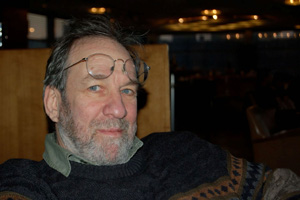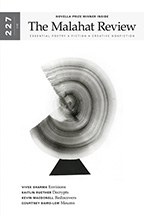A Shadow on Plato's Wall:
Benjamin Willems in Conversation
with Donald Winkler

Malahat volunteer Benjamin Willems talks with Donald Winkler, who will be judging contest entries for Les poésies francophones du Canada: A Translation Prize.
Donald Winkler has been nominated five times for the Governor General's Award! Read his biography here.
Are there translation styles or methods that you’re particularly interested in?
I find it difficult to talk about styles and methods of translation. The style, obviously, must correspond as far as possible to the style of the original. In this respect, a translator is like a character actor who assumes different identities. But that’s the fun of it. It’s a bit like playing dress up. As for method—I never “studied” translation, so nobody tried to inculcate in me a “method.” (Perhaps nobody does.) There are, of course, different practices. Some people may labour over a first draft, while others may prefer initially to just rough something out, and begin refining it afterwards.
When I translate poetry, thanks to the computer, I don’t do drafts. The translation is in a constant state of flux on the screen, with alternate possibilities scattered to the side and below the work in progress. And I keep going at it, sporadically, until enough things click. Sometimes I think of translation as a constant quest for perfect pitch, for hitting a note that is in sympathetic vibration with a note in another language you can no longer hear, a chord from another cosmos.
Is there a point where you start to recognize the traits of translation? And is that welcome, for the most part?
By “trait” do you mean the giveaway that this is but a shadow on Plato’s wall? The trait of the traitor? The moment when it dawns on you that there is a real world elsewhere? I am most aware that I am reading a translation at the two extremes: when it reads sublimely and I just know, without seeing the original, that something magical took place at the translator’s desk; and when, as is sometimes the case in translations of poetry, the translator, however dedicated and persevering, seems to be clawing at a veil that will not part. Poetry with no visceral impact is no poetry at all. Sometimes to be faithful to it, you do have to be a bit of a traitor.
Is there anything you would especially encourage mono-lingual readers to consider while reading French translation?
No more than translation from any other language. Only that since language reflects the way we think, and the way we think determines what we are, a successful translation goes some way toward giving us some sense of what it’s like to be in another culture’s skin.
Would you recommend any recent publications to beginning translators?
Not recent. I was long ago inspired by George Steiner’s After Babel, published in 1975. For something to aspire to, try the paragraph at the bottom of page 428 in the Oxford University Press edition being sold on Amazon. It begins, “But if ‘perfect’ translation is no more than a formal ideal, … there are, none the less, examples which seem to approach the limits of empirical possibility.” And then gives chapter and verse. Just go “inside” the book and try a search, plugging in “empirical possibility.”
Because you’re also a filmmaker, I wonder if you have any opinions about subtitles and the work that goes into them. I've seen too many strange formatting inconsistencies and typos, and I'm sure you've recognized more than I have.
Subtitling is a craft all to itself, an exercise in compression, every entry a haiku or a tweet. I have great respect for the practitioners, who must often work under considerable pressure. My favourite howler occurred at a festival screening of Liv Ullman’s first feature film, when electronic French subtitles were patched on at the last minute, and “bar mitzvah” (in Norwegian) appeared on the screen as the Café Mitzvah!

Benjamin Willems
* * * * * * * *









